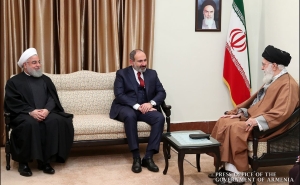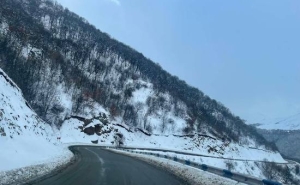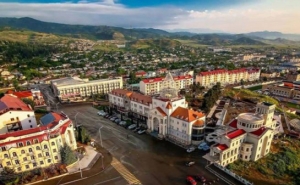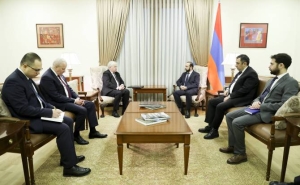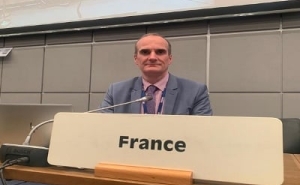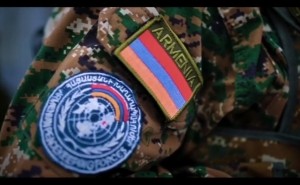Guzenkova: European Policy has Completely Collapsed in Ukraine

"Armedia" IAA presents an exclusive interview with the deputy director of the Russian Institute for Strategic Research, the head of the Moscow Center for Research on the Problems of CIS and Baltic Countries, Tamara Guzenkova.
- How do you assess the process of the Ukrainian crisis settlement? Is there any progress in that process after the last meeting of "Normandy Four"?
- The process of settlement of the Ukrainian crisis is twofold and contradictory. Onone hand it became absolutely clear that the intentions of Russian and European politicians to quickly resolve the process as a whole did not result in a brilliant and rapid success, and the process of the settlement was delayed.
On the other hand, it should be noted that it was possible to record such significant advances of political and diplomatic solution due to which continuous shelling on the fronts and peaceful neighborhoods, killing of civilians stopped. In this sense, the situation has moved towards a peace regime, and now the self-proclaimed republics of Donetsk and Lugansk even have time in order to deal with their domestic policy.
Now constitutional problems and the problem of determining the future of the breakaway territories are on the agenda. Here, of course, a completely different class of difficulties and challenges will be met.
The difficulty is that the Ukrainian leadership works with the principle of "Execution cannot be pardoned." It is impossible to leave these self-proclaimed states the way they are now and it is impossible to unite them, too. On the other hand, Kiev is also not in a position to impose its will on Donetsk and Lugansk.
In any case, it seems to me that now the time works in favor of south-eastern Ukraine, which wants independence. Why do I think so? Because there is already a precedent - South Ossetia, Abkhazia, Nagorno-Karabakh, Transnistria, which suggests that the longer the center and the rebellious region cannot agree, the greater the temporal distance between the start of the conflict and its completion, the less likely it is to solve the conflict on the conditions put forward by the center.
- Judging by the statement made at the end of the last meeting of "Normandy Four", can we consider that the question of Crimea is already not on the agenda of the negotiations and the West itself recognizes it?
- To be short, de jure – no, but de facto – yes. Of course the West is constantly probing the situation, trying to check to what extent the intention of Russia claiming Crimea as part of Russian territory is strong. And now, when it became clear that those intentions are absolute and irreversible, the question really is gradually disappearing from the agenda.
- If we consider in parallel the processes of settlement of conflicts in Ukraine and Syria, are trends of resuming the dialogue between Russia and the West outlined, and is it possible to achieve certain agreements?
- I think, yes, theoretically it is possible. But much depends on the success of the Russian operation in Syria. If it is successful, if the West understands that the position of Bashar Assad is greatly strengthened, he will find ways to portray a brave face and say that really one needs to work with that authority. I think that the West is quite pragmatic, and at some point, it is possible that an entirely new Syrian history may affect the resolution of any disputes, conflicting issues that are not directly connected with Syria.
- Can we consider it possible to reach such agreements, under which a concession in one conflict can lead to a concession of another side in another conflict? Or are you considering these processes completely separate from each other?
- They are not isolated, but are not strictly linked as well. This is a much more complex relationship. Ukrainian epic has its own logic of development. And largely it is related to the fact that the West and Russia both have exchanged with roles. If earlier the West financed the non-governmental sector in Ukraine, then at some point Putin openly stated that "if you are interested in the Europeanization of Ukraine, then pay for everything that is happening there, pay for Ukraine."
And we see that in fact the European policy has completely collapsed in Ukraine. They not only failed to support Ukraine, they just destroyed it. I think in that sense, the West is not interested in resolving the Ukrainian crisis, because if it does so, the West will have to pay for it.
- Let’s now turn to the EEU. How do you think, can the agreement on Iran's nuclear program and the lifting of sanctions influence on the development of regional cooperation of the EEU? What role can Armenia play in the establishment of relations between Iran and the EEU?
- Lifting of sanctions, of course, increases the room for maneuver - both economic and political - in the region. And it certainly makes the situation easier. But I still think that geopolitical players will fight for Iran, for having influence in Iran.
But for Armenia it is certainly a positive signal, and in that sense Armenia could pretty quickly integrate into the possible forms of cooperation. Armenia is a partner with medium-sized and small market economy, but can make proposals to Iran not only as an independent economic market, but also as a mediator, as it is a member of the EEU. This could be a very profitable and promising role for Armenia, and in this sense the lifting of sanctions can be very useful.
Other materials on this subject
- Macron, Scholz and Draghi arrive in Kyiv for Historic Visit This is a message of European unity addressed to Ukrainian men and women, of support.
- EU Prolongs Sanctions against Russia for One Year On June 11, ambassadors of EU member states agreed to prolong restrictive measures against Russia on Crimea. The decision is formalized by a "written procedure" without discussion.
- Ukrainian President Zelensky Extends Ban on Russian Social Networks Sanctions were imposed on several TV channels and Internet companies, including 1C, ABBYY and their Ukrainian subsidiaries. In addition, Russia’s VKontakte and Odnoklassniki social networks, Mail.ru...
- Zelensky Calls Extra NSDC Meeting On Situation In Donbas President of Ukraine Volodymyr Zelensky has called a meeting of the National Security and Defense Council (NSDC) to decide on Ukraine’s further steps following the enemy attack on the positions of the...
- Next Normandy Summit to be Held in Four Months, Macron Says "We are confident that this work on restoring peace and trust is very important," he stressed. Macron noted the significance of the discussion that "has finally been held seriously in the last three years.".
Other materials on this subject
- Turkey Is Ready For a New Military Operation in Northern Syria Kalyn said. He also added that in the event of a threat, ''an assessment will be made and everything necessary will be done.''
- Russia, Iran and Turkey Discussed the Turkish Operation in Syria Russian side tried to convince Ankara to solve the problem by peaceful means, without resorting to violence.
- US Forces in Syria Attacked after Air rRids on Armed Groups Iran-backed armed groups had earlier promised to retaliate after the US launched several air raids on the groups in Iraq and Syria on Sunday.
- Syria: Assad's Baath Party Wins Majority in Parliamentary Polls More than 7,000 polling stations were set up across government-controlled parts of the country. Voting also took place in former opposition-held areas for the time since government forces retook much of...
- Russia, China Veto U.N. Approval of Aid Deliveries to Syria from Turkey The Security Council will now vote on a rival Russian text that would only approve one Turkish crossing for aid access for six months. During the coronavirus pandemic the council has been operating virtually,...
-
 17:08
17:08The regular session of the Anti-corruption Policy Council takes place in Jermuk
-
 15:05
15:05The Prime Minister sends congratulatory messages to the supreme leader of Iran and the President of Iran
-
 11:11
11:11Armenia sends earthquake aid to Turkey
-
 10:43
10:43Commemoration of the Pontiff St. Sahak Partev
-
 09:16
09:16Some roads are closed and difficult to pass in Armenia
-
 19:55
19:55Phone conversation of the Foreign Minister of Armenia with the U.S. Assistant Secretary of State for European and Eurasian Affairs
-
 18:30
18:30Prime Minister Pashinyan and President Khachaturyan meet
-
 18:20
18:20Ararat Mirzoyan with Co-Chairman of the OSCE Minsk Group of France Brice Roquefeuil
-
 17:01
17:01Humans could land on Mars within 10 years, Musk predicts
-
 16:45
16:45France, US urge 'immediate' end to Nagorno Karabakh blockade
-
 16:01
16:01Blockaded Nagorno Karabakh launches fundraiser to support quake-hit Syria
-
 15:59
15:59Earthquake death toll in Turkey rises to 18,342
-
 15:43
15:43Ararat Mirzoyan Held a Telephone Conversation with Sergey Lavrov
-
 15:06
15:06French president rules out fighter jet supplies to Ukraine in near future
-
 14:47
14:475 Day Weather Forecast in Armenia
-
 14:44
14:44President Vahagn Khachaturyan wrote a note in the book of condolences opened in the Embassy of Syria in Armenia
-
 14:20
14:20Azerbaijan’s provocations impede establishment of peace and stability – Armenian FM tells Russian Co-Chair of OSCE MG
-
 12:57
12:57France representation to OSCE: Paris calls on Azerbaijan to restore freedom of movement through Lachin corridor
-
 11:40
11:40Command of Kosovo forces highly appreciated preparation of Armenian peacekeepers
-
 10:16
10:16The United States withdrew from sanctions against Syria for six months the provision of assistance after the earthquake
day
week
month
Humidity: %
Wind: km/h


